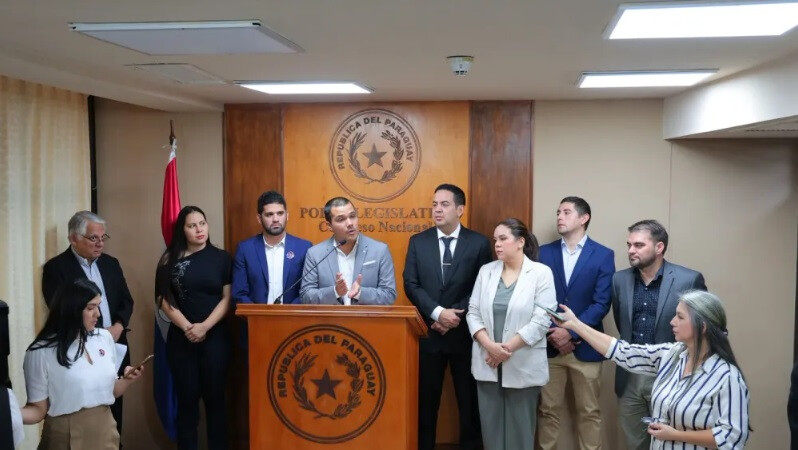
The government of the Central Department of Paraguay has submitted a draft bill to the National Congress aimed at fundamentally reforming the public transportation system, addressing long-standing issues such as functional duplication among government ministries and legal loopholes.
Ricardo Estigarribia, the Governor of the Central Department, along with his technical team and opposition members of Congress, jointly prepared and officially submitted the public transportation system reform bill to Congress, detailing its contents. This reform proposal focuses on establishing a more efficient and systematic public transportation system through a clear division of roles between the central and local governments.
Speaking at the presentation, urban planning expert Fernando Maidana Venegas stated, "We are presenting a bill to redefine the powers held by each level of government." He pointed out that "currently, three levels of government have different powers and responsibilities, but there is functional duplication and legal ambiguity." He particularly emphasized that the repeal of the Asunción Metropolitan Transportation Authority (SETAMA) law and the creation of the Vice-Ministry of Transportation led to "confusion in the legislative order related to public transportation," underscoring the necessity of this reform bill.
The core of this reform proposal is to maintain regulatory authority at the central government level while decentralizing operational authority to local governments. Architect Maidana explained that "the Vice-Ministry of Transportation should continue to be responsible for national regulations, supervision, intercity and international buses," but stressed that "urban and interurban buses operating between cities should no longer be the sole responsibility of the Vice-Ministry but rather a shared responsibility of the departmental government and municipalities."
Maidana made it clear that the Vice-Ministry of Transportation does not have sufficient resources to cover all the areas it currently handles. He noted, "One of the weaknesses of the Vice-Ministry of Transportation is its current lack of operational capacity to manage public transportation. While the technical skills of its staff are excellent, their operational capacity is not."
Furthermore, he proposed the integration of the National Directorate of Transportation (DINATRAN) and the Vice-Ministry of Transportation. "Today we have a dual structure. It's like having two heads for one body. DINATRAN and the Vice-Ministry of Transportation have completely different regulations, which leads to disagreements even among transportation operators," he explained. In fact, Paraguay's public transportation system has been consistently criticized for its inefficiency due to a complex regulatory structure and the division of supervisory bodies, causing inconvenience to citizens. The integration of these two entities is expected to resolve this inefficiency and enable the implementation of consistent policies.
Regarding the Greater Asunción area, Maidana emphasized that public transportation inherently connects multiple municipalities and therefore cannot be regulated by the authority of a single local government. He added, "If we need to go from Itauguá to Asunción, or from Caacupé to Luque, it's useless if urban buses only operate within their own cities. Municipalities cannot regulate services that extend beyond their jurisdiction."
This public transportation reform bill includes the creation of a departmental council that integrates the departmental government and municipalities. The goal of this council is to plan and operate public transportation in a coordinated and equitable manner for all municipalities. This is expected to allow for the development of customized public transportation systems that reflect the specific characteristics and needs of each region.
Maidana reiterated, "We need clear authority, clear governance, and a single, orderly authority. Only then can we understand who is responsible, and can orderly public transportation standards be established." It remains to be seen whether this reform bill can improve the efficiency of Paraguay's public transportation system and enhance the mobility of its citizens.
Paraguay's public transportation system has long suffered from problems such as inefficiency, congestion, and low service quality. The Greater Asunción area, in particular, has a high population density and traffic volume, leading to a persistent need for improvements to the public transportation system. While metropolitan transportation management bodies like SETAMA existed in the past, their functionality was hampered by political and administrative issues, ultimately leading to their dissolution. Although the Vice-Ministry of Transportation was subsequently created, it has been criticized for lacking the personnel and budget necessary to effectively manage the public transportation system across a wide area.
The Central Department government's reform proposal is significant in that it recognizes these problems and is designed to expand the operational autonomy of local governments while streamlining the regulatory functions of the central government. The proposal to create a departmental council to strengthen cooperation between local governments and establish a foundation for developing public transportation systems tailored to regional characteristics is particularly noteworthy.
However, there are still many challenges to overcome before this reform bill is finally passed by Congress and takes effect. Unexpected obstacles may arise during the consultation process with relevant ministries and stakeholders, as well as during the congressional review process. Furthermore, securing sufficient funding and establishing an efficient operating system will be essential for the new system to be successfully implemented.
Nevertheless, the Central Department government's initiative is seen as an important first step towards improving Paraguay's public transportation system. The proactive efforts to resolve long-standing issues and the government's commitment are evident, warranting continued attention to the congressional deliberation process and the actual policy implementation outcomes.
[Copyright (c) Global Economic Times. All Rights Reserved.]




























